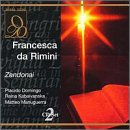| All Artists: Riccardo Zandonai, Eve Queler, Plácido Domingo, Raina Kabaivanska, Matteo Manuguerra, Harlan Foss, Sheryl King, Barbara Hoffman, Alice Marie Nelson, Nuccio Saetta, Carole Walters, Frederika Wisehart Title: Zandonai - Francesca da Rimini / Domingo, Kabaivanska, Manuguerra, Queler Members Wishing: 0 Total Copies: 0 Label: Opera D'oro Release Date: 8/17/1999 Genre: Classical Style: Opera & Classical Vocal Number of Discs: 2 SwapaCD Credits: 2 UPC: 723723594020 |
Search - Riccardo Zandonai, Eve Queler, Plácido Domingo :: Zandonai - Francesca da Rimini / Domingo, Kabaivanska, Manuguerra, Queler
 | Riccardo Zandonai, Eve Queler, Plácido Domingo Zandonai - Francesca da Rimini / Domingo, Kabaivanska, Manuguerra, Queler Genre: Classical
|
Larger Image |
CD DetailsSimilar CDs
|
CD ReviewsGreat Work--Poor Sound Eric D. Anderson | South Bend, IN United States | 12/23/2000 (4 out of 5 stars) ""Francesca da Rimini" is a neglected masterwork. But those approaching the work expecting to hear second rate Puccini will be disappointed. Zandonai's musical idiom, while certainly retaining moments of Italian lyricism, is far more modern than Puccini's and may not appeal to those who dislike, say, the operas of Richard Strauss. But certain passages of "Francesca" are riveting--the "wordless love duet" at the end of act one, with its intensely romantic atmosphere and mysterious off-stage female chorus, and the gripping final scene are but two examples.Sadly, this release doesn't do all that glory justice. The rather dim live sound, and lack of libretto are serious drawbacks. But, hey, for ten bucks you can't complain. Let's just hope that a better recording WITH libretto shows up soon. Perhaps a better introduction to the work would be the Met video of "Francesca" with Domingo and Renata Scotto." A different kind of opera Eric D. Anderson | 07/08/2004 (5 out of 5 stars) "When Zandonai's most famous opera, "Francesca da Rimini," premiered at Turino in 1914 (at the Met in 1916) opera goers were still in the melodic grip of the grand Puccini. Zandonai was quite a surprise. There are no arias, per Puccini, still the lovely aria, "Paolo, Paolo, datemi pace," is such an earnest plea from the tragic Francesca who loved only Paolo, but was in a forced political marriage to his warring brother. The brothers are unique in each part, and run the gamut from menacing to gentle. The women's parts are tender and sweet. The contralto singing the maid servant of Francesca is splendid. It is commonly agreed that the great Raina Kabaivanska is the preeminent interpreter of Francesca. Her amazing pianissimi and complete vocal control are the envy of many, if not most, divas. The thrilling artistic compatability of Kabaivanska and Domingo in "Tosca" and "Il Trovatore," are equalled in this performance. As important as the story line taken from a tale from Dante's "Inferno" is, the hauntingly beautiful harmonies Riccardo Zondonai has interposed throughout the opera are its crowing glory. They, with with the lack of defining arias, set the tone for this innovative and magnificent work. Because you will not hum along with any of this, it is recomended for the listener to know the story, follow with libretto in hand. Seen and heard, this is a heartbreakingly beautiful opera. Heard, alone, may be a challenge, but one well worth the time and effort to understand and appreciate. G.K Brown, DMA, Profesor of Music, Ret." Pretty boring John Cragg | Delta(greater Vancouver), B.C Canada | 12/21/2000 (2 out of 5 stars) "Zandonai, judged by this work, deserves to be ignored. It is a very unmelodic piece, largely made up of declaratory singing of little musical form, interspersed with rather amorphous but pretentious passages for the orchestra. The performers in this live recording probably make as much of the material as can be done. Domingo's voice and delivery is such that he would be intgeresting singing the phone book and he has the ideal tenor voice for this sort of material. Here he is recorded with a rather remote acoustic most of the time but otherwise breathes some fire into these dying embers of Italian opera. Raina Kabaivanska in the title role demonstrates a wide tonal and dynamic range and a good ability to avoid shrieking as much as the music seems to invite. Matteo Managuerra is well contrasted with Domingo and Nuccio Saetta sounds like the unpleasnt villain he is supposed to be. Eve Quiller as conductor appears to work hard with most unpromising material.A very serious weakness of the set is the lack of libretto. The brief essay and synopsis -- not keyed to the index tracks -- give little indication of what is going on, and the phrases are sufficiently dragged out that one cannot usually spot the words, let alone make sense of the drama. Since drama is about all that this may have going for it, the lack of libretto is even more serious than usualI found this recording of interest and worth its very modest price. But now that I have heard it a couple of times, I wouldn't buy a ticket even if the opera were to be revieved in a place where I could attend it, nor would I buy another recording of it."
|

 Track Listings (20) - Disc #1
Track Listings (20) - Disc #1